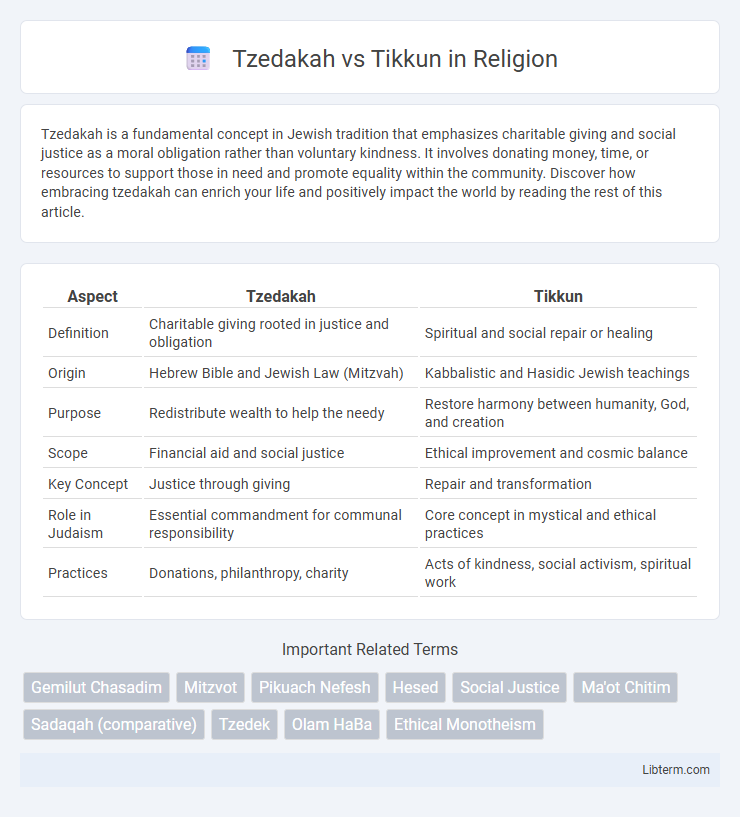Tzedakah is a fundamental concept in Jewish tradition that emphasizes charitable giving and social justice as a moral obligation rather than voluntary kindness. It involves donating money, time, or resources to support those in need and promote equality within the community. Discover how embracing tzedakah can enrich your life and positively impact the world by reading the rest of this article.
Table of Comparison
| Aspect | Tzedakah | Tikkun |
|---|---|---|
| Definition | Charitable giving rooted in justice and obligation | Spiritual and social repair or healing |
| Origin | Hebrew Bible and Jewish Law (Mitzvah) | Kabbalistic and Hasidic Jewish teachings |
| Purpose | Redistribute wealth to help the needy | Restore harmony between humanity, God, and creation |
| Scope | Financial aid and social justice | Ethical improvement and cosmic balance |
| Key Concept | Justice through giving | Repair and transformation |
| Role in Judaism | Essential commandment for communal responsibility | Core concept in mystical and ethical practices |
| Practices | Donations, philanthropy, charity | Acts of kindness, social activism, spiritual work |
Understanding Tzedakah: Definition and Origins
Tzedakah is a Hebrew term meaning righteousness or justice, fundamentally linked to the ethical obligation of charity in Jewish tradition, originating from biblical and rabbinic texts such as Deuteronomy 15:7-8 and the Talmud. It emphasizes the duty to help those in need as an act of social justice, distinct from voluntary charity by being a mandated moral responsibility. Understanding Tzedakah involves recognizing its role in fostering communal equity and reflecting divine justice, deeply embedded in Jewish law and culture.
Exploring Tikkun: Meaning and Historical Context
Tikkun, derived from the Hebrew word meaning "repair" or "rectification," plays a central role in Jewish thought by emphasizing the restoration of moral, social, and cosmic order. Historically, Tikkun has roots in Kabbalistic teachings, where it refers to the metaphysical repair of the world and the soul, contrasting with Tzedakah, which primarily focuses on acts of charity and justice. Understanding Tikkun's evolution reveals its broader application beyond charity, encompassing personal growth and societal transformation as fundamental components of Jewish spirituality.
Core Principles: How Tzedakah and Tikkun Differ
Tzedakah emphasizes justice through charitable giving and fulfilling social obligations, focusing on redistributing wealth to support those in need. Tikkun centers on repairing the world by promoting social change, ethical behavior, and environmental sustainability to create long-term systemic improvements. While both concepts share a commitment to social responsibility, Tzedakah addresses immediate relief, and Tikkun involves proactive efforts to heal societal and spiritual divisions.
The Role of Charity in Jewish Tradition
Tzedakah, rooted in the Hebrew word for righteousness, embodies the Jewish mandate to perform charity as a moral obligation rather than voluntary generosity, ensuring social justice and equity. Tikkun, especially Tikkun Olam, reflects the broader mission to repair the world through acts of kindness, justice, and ethical responsibility, often overlapping with charitable deeds to create systemic change. Charity in Jewish tradition serves both as a means of individual fulfillment of divine commandments and as a communal effort to restore harmony and balance in society.
Social Responsibility: From Individual to Community
Tzedakah emphasizes the ethical obligation of individuals to provide charitable support, promoting social justice by addressing immediate needs such as poverty and hunger. Tikkun, often referred to as Tikkun Olam, expands social responsibility to a collective level, focusing on repairing and improving society through systemic change and community-building efforts. Together, these concepts encourage a balance between personal acts of kindness and broader initiatives aimed at creating sustainable social transformation.
Practical Applications: Giving vs. Repairing
Tzedakah emphasizes the practical act of giving financial aid or resources directly to those in need, serving as an ethical obligation to promote social justice and reduce inequality. Tikkun, often referenced as Tikkun Olam, involves repairing or improving the world through social activism, environmental efforts, and systemic change to address root causes of injustice. In daily practice, Tzedakah involves charitable donations and support, while Tikkun encourages community engagement and sustainable solutions for long-term societal improvement.
Tzedakah in Modern Society
Tzedakah, rooted in Jewish tradition, represents a structured form of charitable giving emphasizing justice and responsibility, rather than voluntary charity. In modern society, Tzedakah actively addresses systemic inequalities by promoting social welfare programs, educational initiatives, and poverty alleviation strategies. Unlike Tikkun Olam, which focuses broadly on repairing the world through social activism and environmental efforts, Tzedakah centers on equitable resource distribution to fulfill moral obligations and support vulnerable communities.
Tikkun Olam: Repairing the World Today
Tikkun Olam, a fundamental Jewish concept, emphasizes the ethical responsibility to repair and improve the world through social justice, environmental stewardship, and community activism. Unlike Tzedakah, which centers on charitable giving and supporting those in immediate need, Tikkun Olam addresses systemic issues by promoting sustainable change and collective well-being. Modern applications of Tikkun Olam manifest in advocacy for human rights, environmental protection, and efforts to bridge social inequalities globally.
Interplay and Balance: Integrating Both Concepts
Tzedakah, the charitable act of giving, and Tikkun, the concept of repairing or restoring the world, work together to create a holistic approach to social justice. By combining Tzedakah's immediate financial support with Tikkun's long-term systemic change, individuals and communities foster sustainable improvement. Balancing both principles enables a comprehensive impact, addressing both urgent needs and underlying causes of inequality.
Tzedakah and Tikkun in Personal and Communal Growth
Tzedakah, rooted in the Hebrew tradition of righteous giving, fosters personal growth by encouraging individuals to cultivate empathy and responsibility toward others, while promoting communal well-being through equitable resource distribution. Tikkun, often referred to as Tikkun Olam or "repairing the world," drives collective efforts toward social justice and environmental sustainability, enhancing community resilience and shared values. Both concepts intertwine to create a framework for ethical living that balances individual charity with systemic transformation for long-term personal and communal advancement.
Tzedakah Infographic

 libterm.com
libterm.com